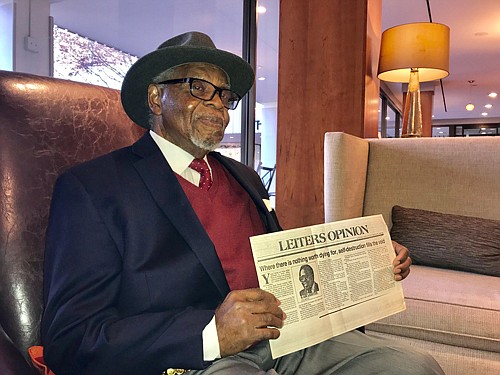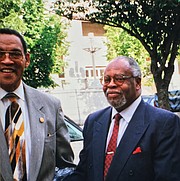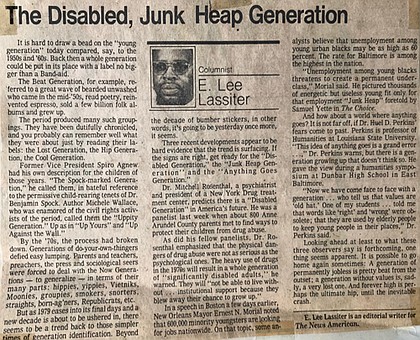The son of a sharecropper, Dr. E. Lee Lassiter’s own story could have just as easily filled the pages of the newspapers he once worked for over the course of his 30-year journalism career. The story of how it all started can be traced back to his days when he and his late brother Willis were students at Berry O’Kelly High School in Raleigh, North Carolina.
“Berry O’Kelly High School had a strong curriculum,” recalled Dr. Lassiter, who will be 84 in July. “Berry O’Kelly was a private school taken over by the state. To get there, my older brother Willis and I had to walk four miles to catch a “cheese bus,” ride 20 miles, change buses at the elementary/junior high school, and ride the second bus 16 more miles. We made that trip in the morning, and in the afternoon.
Courtesy Photo
The late entrepreneur Harlow Fullwood and Dr. E. Lee Lassiter in an undated photo.
“Willis and I had to get up at 4 a.m. to catch the first bus. It was fun, but it was hard. Although there was a school that was closer, we thought the walking and bus rides were worth it. Berry O’Kelly was a good school and highly accredited.”
Dr. Lassiter reflected on an experience that sparked his interest in journalism:
“I was in my senior year at Berry O’Kelly” he said. “At the time, some of the schools had a practice of bringing in seniors from colleges to do their internships in teaching. One of those schools was my high school. One day, one of the colleges sent one student too many. They didn’t send her back, but instead stationed her in the library.
“They wanted her to start a newspaper at my high school. She started a paper called The Busy Bee. As a student leader, I became the editor of the paper. At the time, I didn’t even know what journalism was. She taught us about newspapers, the roles they played in society, and how they worked.”
Dr. Lassiter graduated from Berry O’Kelly High School in 1954 as salutatorian of his class. Later that year, he departed the train station in his native North Carolina for the trip to Alabama.. He was headed to Tuskegee Institute (now Tuskegee University). He arrived at Tuskegee with no money, the editorial knowledge he received at Berry O’Kelly High School, and a desire to learn.
“My editorial experience with The Busy Bee helped determine my career. When I went to college, I had three possible career tracks. Electrical engineering, commercial illustration, and journalism. Electrical engineering was where the money was. That was my first major when I went to Tuskegee. But I didn’t do well in electrical engineering. I had drawing skills in high school and junior high school. But they didn’t have commercial illustration at Tuskegee. So, I was down to my third choice – journalism,”
Ursula V Battle
The Disabled, Junk Heap Generation, one of the many editorial pieces Dr. Lassiter wrote as a columnist for The News American
He recalled how he “earned” his education. “Tuskegee had a program called the Five-Year Work Study Plan. The plan allowed you to contract to work for the school for five years to earn your four-year degree. But I had to pay $150 dollars out-of-pocket. The rest you paid with the money you earned. I knew that if I got that $150, I could work my way through.
“My father gave Willis and I a plot of land. He said whatever we made off the plot of land belonged to us. We rushed to get tobacco to sell. My brother told me to take his half and go to school. That’s how I got the $150. Once I got to Tuskegee, I didn’t have money to eat. Fortunately, a student from my high school let me use his meal ticket. That’s how I ate. I worked seven-days-a-week, eight-hours-a-day for the school. They paid us in pink vouchers. Those vouchers got us room, board and tuition.”
Noting Tuskegee founder Booker T. Washington, Dr. Lassiter said, “Booker T. Washington’s philosophy was that there was dignity in work, no matter the job. They put that in our head. The work-study students were well respected. The students looked up to us, but we did not have one cent. I was from the country and had a farming background. Tuskegee was the perfect setting. God was in it.”
He graduated from Tuskegee Institute (now Tuskegee University) in 1959 with a B.S. degree in Secondary Education. He received an M.S. in Journalism from Boston University in 1963. He would later earn a doctorate from Morgan State University in 1994.
“When I graduated from Boston University, I tried to get a job like everyone else,” said Dr. Lassiter. “But not one white paper would hire a black journalist.”
Coming next week: Part II.


